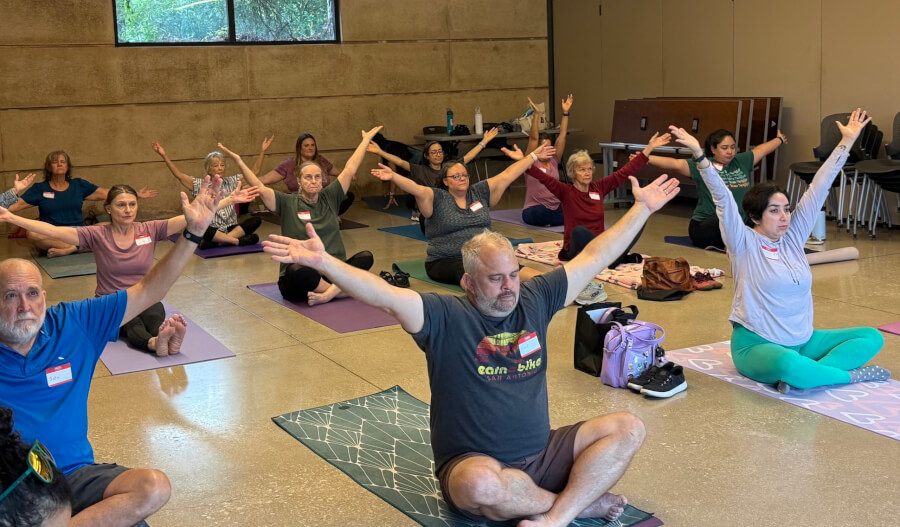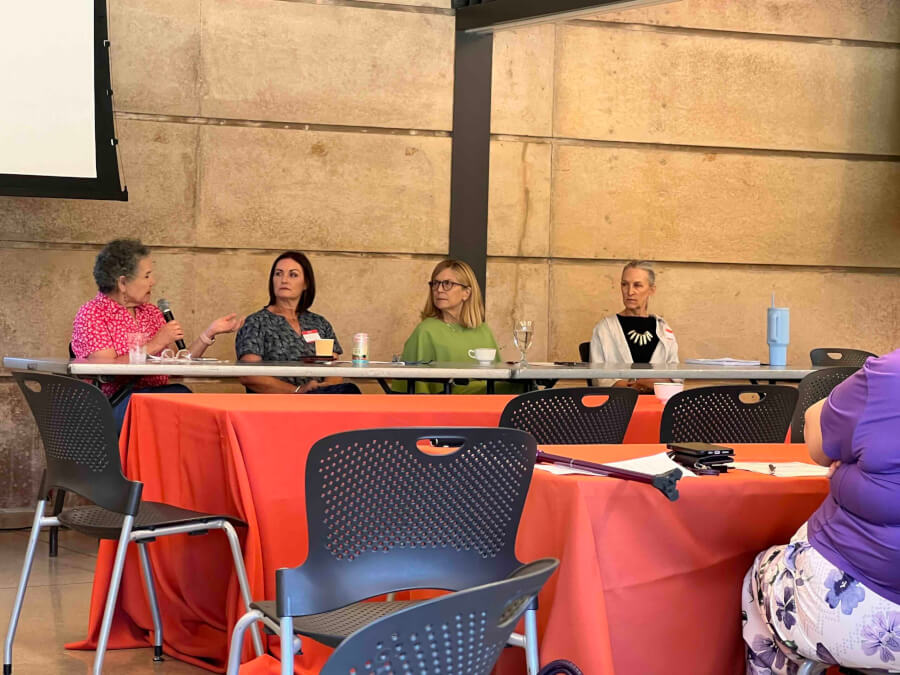When the UT San Antonio School of Nursing launched its Green Wellness Program: Plants-2-Plate four years ago, the goal was simple yet ambitious. The program co-founders sought to help patients take charge of their health through lifestyle medicine, a method that focuses on using evidence-based lifestyle changes to prevent, treat and reverse chronic diseases.
Today, the program has grown into a model of care that is transforming lives across South Texas and drawing attention from far beyond it.
“We built this program because we saw too many patients suffering from preventable diseases. We wanted to give them the tools to take charge of their health in a sustainable, evidence-based way,” said Heidi Benavides, DNP, MSN, APRN, RN, CMSRN, FNP-C, associate professor/clinical and one of the program’s founders.
A different approach
At its core, the Green Wellness Program is a six-month, evidence-based lifestyle medicine program built around six pillars: a whole-food, plant-based eating pattern, physical activity, restorative sleep, stress management, healthy social connections and avoiding risky substances.
 Participants have access to a team of nurse practitioners and a registered dietitian.
Participants have access to a team of nurse practitioners and a registered dietitian.
Unlike traditional one-on-one appointments, participants attend shared medical visits with an interdisciplinary team that includes nurse practitioners and a registered dietitian, all affiliated with the School of Nursing’s clinical practice, Wellness 360. The collaborative setting provides education and encourages community, accountability and support.
“The beauty of lifestyle medicine is that the benefits don’t take years to see,” Benavides said. “Within weeks, patients report more energy, lower blood pressure and improvements in daily living.”
From pilot to impact
What began in 2019 with a small pilot has since expanded to more than 240 patients, with over 1,000 online inquiries from people all over the U.S. interested in joining.
 Anniversary event attendees were treated to an optional morning yoga class.
Anniversary event attendees were treated to an optional morning yoga class.
That growth was celebrated Aug. 23 during the program’s fourth anniversary event at the San Antonio Botanical Garden. The morning featured an optional yoga session, a vegan breakfast, participant reflections, a panel discussion and a Q&A session — embodying the same community spirit that has carried the program since its pilot days.
“When we launched the pilot, we weren’t sure how it would be received,” said Paula Christianson-Silva, DNP, FNP-BC, ANP-BC, DipACLM, associate professor/clinical and program co-founder. “Four years later, to see 19 cohorts completed and more than 1,100 inquiries has been extraordinary.”
Research funding from partners such as the school’s Nursing Advisory Council, Morrison Trust and the UT San Antonio Graduate School of Biomedical Sciences’ Nestle Helmut Maucher Endowment has helped the program grow. Its founding faculty have also presented program findings at national conferences and published them in leading health, nursing education and nutrition journals.
Transforming lives
Participants often report improvements in weight, energy levels, blood pressure and overall quality of life. For many, the program reframes health as joy in daily living instead of fear of illness.
“South Texas has some of the highest rates of chronic disease in the country,” said dietitian Christiane Meireles, PhD, RD, LD, clinical associate professor and program co-founder. “We knew from the beginning this program had to be culturally relevant and accessible to our community.”
Gabby Hastings, a participant in the Green Wellness Program, said the experience was life changing.
 The event featured expert panelists: (from left to right) Adelita Cantu, PhD, RN, CHWI, FAAN; Eiryth Finniga, PhD; Paula Christianson-Silva, DNP, FNP-BC, ANP-BC, DipACLM; and Dion Turner, RDN, LD, DipACLM.
The event featured expert panelists: (from left to right) Adelita Cantu, PhD, RN, CHWI, FAAN; Eiryth Finniga, PhD; Paula Christianson-Silva, DNP, FNP-BC, ANP-BC, DipACLM; and Dion Turner, RDN, LD, DipACLM.
“When I enrolled in the program, I was not in my best health, but I was willing to make a change,” Hastings said. “I looked forward to the classes each week and meeting the other participants. Being around others who also wanted to improve their health inspired me. The program gave me practical tools to incorporate more plant-based foods into my diet and sparked my passion for public health.”
Hastings said the program influenced her decision to pursue a master’s degree in public health at UT San Antonio’s School of Public Health, where she is now in her second year. “I even completed an internship with the San Antonio Food Bank to better understand its impact in our community,” she said. “I want to help improve the healthcare system by encouraging healthier eating habits. I hope this program inspires others not only to live their healthiest lives, but also to take on new endeavors.”
“Our research has shown that when patients have culturally tailored support — recipes, group discussions, even just being seen by people who understand their background — their engagement and outcomes are stronger,” Meireles added.
Why lifestyle change matters
Chronic diseases such as diabetes, heart disease and obesity remain leading causes of illness in the U.S., but research shows many can be prevented or reversed through diet and lifestyle changes.
 Shared medical visits encourage community, accountability and support.
Shared medical visits encourage community, accountability and support.
“Lifestyle medicine is transforming primary care,” said Christianson-Silva. “That’s especially important in Texas, which ranks second in the nation for obesity. Our focus is on helping patients make daily changes that align with their own values and motivations. Many people feel discouraged when they ‘fall off the wagon,’ but there is no wagon; this is life. The goal is to learn how to make your lifestyle work for you.”
The School of Nursing envisions an even broader reach for the Green Wellness Program.
Future plans include telehealth offerings, philanthropic support to extend access to the uninsured and specialized cohorts tailored to certain diseases. A commercialization strategy is also underway, potentially bringing the UT San Antonio-born program to a national audience.
“Our long-term vision is to make this program accessible to everyone who wants it, regardless of insurance or income,” Christianson-Silva said. “That’s where philanthropy and telehealth will play a huge role.”
For now, the team is preparing for its next round of participants. Registration for the upcoming cohort will open soon, offering San Antonians another chance to take part in a program that is proving lifestyle change is not only possible, but powerful.
The next Green Wellness Program: Plants-2-Plate cohort will meet Wednesdays from 3– 4 p.m., beginning Oct. 8, 2025.
There is a $75 program charge, and all appointments are insurance-billed. Patients are responsible for insurance co-pays and deductibles.
Those interested in joining or in need of more information should fill out the inquiry form here.
Discover more about the Green Wellness Program
Want to dive deeper into the ideas behind the Green Wellness Program? Explore these recent features:
- UT Health San Antonio Well-Being Podcast — Episode 8: “Food and Mood” (featuring Heidi Benavides, DNP, MSN, APRN, RN, CMSRN, FNP-C) Watch on YouTube here
- Texas Public Radio’s Science & Medicine: Plants-2-Plate (featuring Paula Christianson-Silva, DNP, FNP-BC, ANP-BC, DipACLM) Listen to the episode here
